Keeping a few chickens in the back yard really is quite straight forward; however there are some things to consider in order to get the right sort of birds for your situation and to keep them in the best possible health to get the most enjoyment out of keeping them.
This page hopes to get you thinking about the types of chickens and their requirements.
Choosing a breed
There are quite literally hundreds of different breeds of chicken to choose from and out of these, many have slightly different requirements.
Some breeds of chicken come only as Large Fowl, and others are also available as Bantams which are a smaller version that look the same. The Orpington for example is available in both large and bantam sizes but the Cochin is only available as large fowl.
There are a handful of ‘True Bantams’ where there is no large fowl equivalent. Examples of these are Dutch Bantams, Japanese Bantams and the popular Pekin Bantam.
Bantams tend to be quite flighty whereas the heavy breeds of large fowl often cannot fly more than a few inches off the ground. Orpingtons for example won’t usually roost very high due to their huge size and will usually just huddle on the floor of the coop.
Every breed is slightly different in the amount of eggs they lay. Typically hens that have been bred for exhibition purposes do not lay as well as utility hens. Bantams of course lay smaller eggs which some people say they prefer for taste.
Hybrids
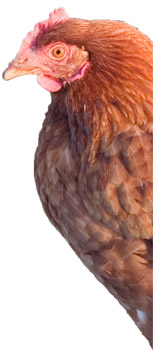 Hybrids are chickens that have been created by crossing pure breeds. They are typically crossed to make good layers (the hybrid to the right can lay 280 to 300 eggs!), coloured eggs or attractive hens. Some can be very attractive and they are all generally very hardy. Hybrids are produced in larger numbers that pure breeds and most of the crosses used make the males a different colour as day old chicks so that only females can be raised, therefore reducing costs by about half. A typical hybrid hen will cost you around £15 compare to £25 to £30 for a typical pure breed hen.
Hybrids are chickens that have been created by crossing pure breeds. They are typically crossed to make good layers (the hybrid to the right can lay 280 to 300 eggs!), coloured eggs or attractive hens. Some can be very attractive and they are all generally very hardy. Hybrids are produced in larger numbers that pure breeds and most of the crosses used make the males a different colour as day old chicks so that only females can be raised, therefore reducing costs by about half. A typical hybrid hen will cost you around £15 compare to £25 to £30 for a typical pure breed hen.
Hybrids are a good choice if eggs are one of your priorities although if you think you might like to hatch some eggs, remember hybrid hens do not breed true – you would need the original pure breeds to cross again in order to create more of the same thing so whilst you can hatch their eggs, you may want to consider a few pure breeds for this purpose or consider buying in eggs to hatch.
Free Range
You will of course need a chicken coop but also a secure run or area that is predator proof. A question that people always ask me is “How big should their run be?” I always say “as big as possible within reason.” Even 2 chickens kept in a 2 meter run will soon turn it to mud and get bored (which can introduce vices such as feather pecking and egg eating) but I always believe that it’s fine to provide a small run like this if you can let them out for a few hours each day to free range while you are around. This will give them a chance to forage, supplement their diet and reduce boredom.
Once chickens have settled into their new house, they will go back to it to roost every night so you can let them out in the late afternoon, knowing they will come back to roost at night keeping everyone happy! Some houses and runs have handles or wheels that make them easy to move onto fresh ground which is not only good to prevent a build up of worm eggs and disease but also provides them with a little fresh grass to graze.
Keeping Chickens in the Garden
If you have a ‘nice’ garden that you don’t want spoilt, it’s usually a sensible idea to limit their foraging. Chickens scratch at the ground, make dust baths in the dry soil, leave muck wherever they go and destroy tender young plants. If you can plant in pots, this will help and fencing off part of the garden is usually a good choice to keep them out if you have tender or precious plants. Chickens with feathered feet scratch less and bantams can clear a 6 foot fence if they want to. Heavy breeds of large fowl can be kept out with a knee high fence or box hedge. If you want to stop a bird from flying then you can clip one wing (not both).
So you have decided on the breed that’s right for you and your circumstances. Next, you will need to think about keeping them secure from predators in a suitable chicken house and chicken run – click on a link to go to that page!


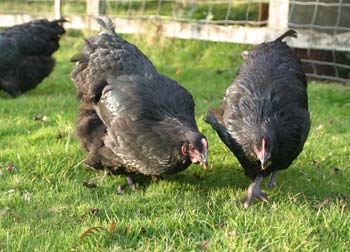
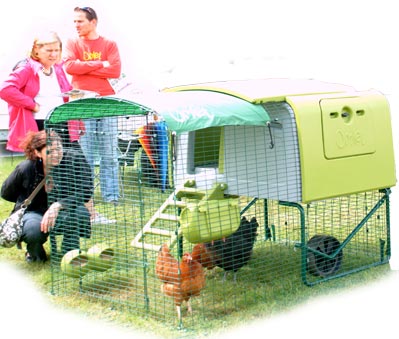
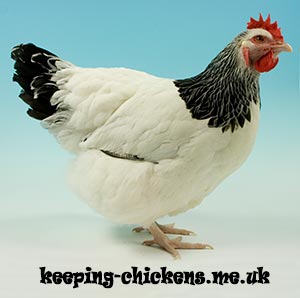
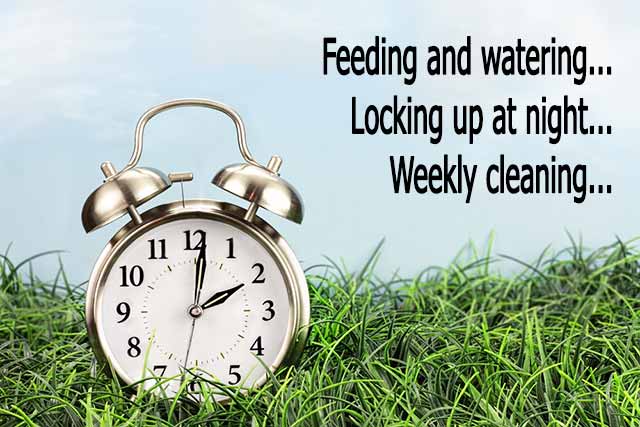

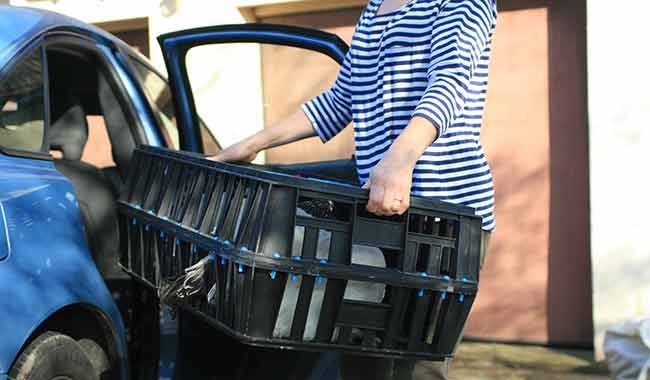
Sorry if you’ve been asked this a million times, but: we have a fenced-in rectangular back garden that is about 30mx10m. I was hoping to get 2-3 hens, and was wondering if they’d be ok just roaming around the whole place. There’s a little vegetable patch at the back, and a flower border all down one side. Would they need to be protected?
Would I be better confining them to a certain area (and rotating that area, of course), or would they be ok (and would my garden be ok!) constantly roaming the whole garden?
Apologies for so many questions! I’m just a bit enthusiastic.
It would be better to fence an area off, this keeps them safe from the fox but also keeps them off your vegetable beds and flowers (they love to scratch the soil up) and the poo off the path!
You can still let them out when you don’t have anything precious growing and they can mop up some insects and slugs.
hi, just picking up new hens about 9 months old this week, do i need to keep them in for any time before i let them free range garden.
I would keep them in a day or two just so they can learn where home is. You will normally have to put them in at night for the first week or so as well until they learn where to roost.
I need to speak to someone as am concerned about the welfare of some chickens nearby. Is there anyone here I can ask?
The RSPA?
I was hoping to rehome battery chickens but you haven’t mentioned them on here. Is there any difference in their care as opposed to what you have already mentioned?
Yes, it does depend on the state of them when you get them – there is some excellent guidance on the poultrykeeper.com website – Try http://poultrykeeper.com/rehoming-battery-hens/tips-on-re-homing-ex-battery-chickens
Hi there,
really appreciate your website and we are about to make an outside run, ready for our birds to arrive!
One question that i could not find the answer is this, we have two 5 month old puppies (very small dogs) and i am concerned that they may upset the chickens. can anyone help me with this?
i would rather not get the chickens if it meant they were upset?
i hope that once the initial suprise in seeing them, they will leave the chickens alone. is this wishful thinking??
thanking you in advance!!
Darron
If the chickens are in a run (which is essential if there are foxes or other predators around) then the puppies shouldn’t bother them.